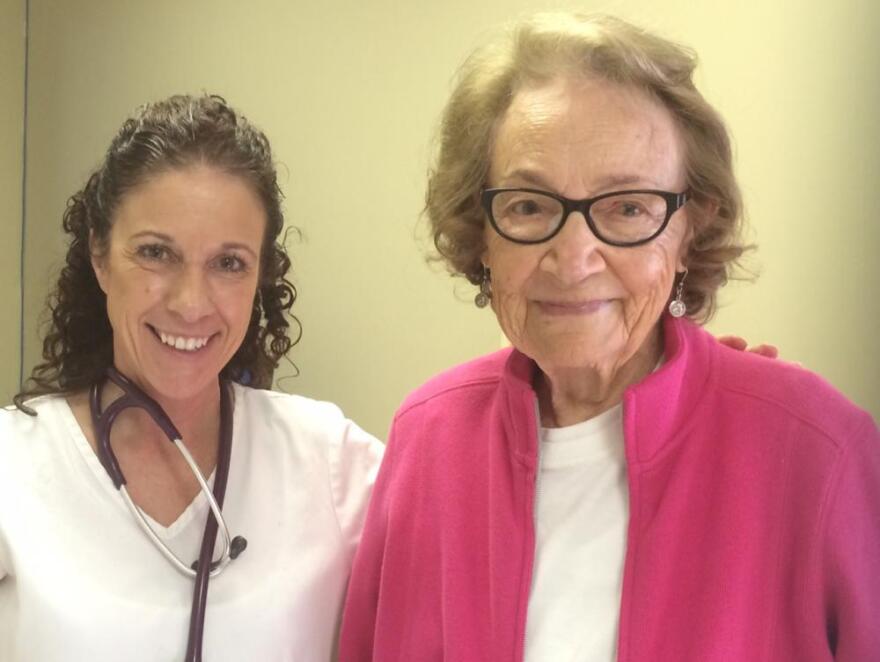When Elizabeth Newman was released from the hospital after having a heart attack, the staff told her to check in with a primary care doctor.
So, a few days later, Newman arrived at her appointment. But instead of seeing the doctor, she first met with nurse Sally Clarke.
"I’m 94 years old, I’m lucky that I..." Newman says, laughing before finishing her sentence.
Next to her is Clarke, a registered nurse hired by the doctors at Faith Medical Associates to help manage patients.
Clarke smiles and says, "You’re 94 and beautiful!"
Newman laughs and relaxes. Clarke begins her exam and says, "So you were in the hospital. Do you know why you were in the hospital?"
The two hit it off. To explain why Newman was in the hospital, the nurse draws a diagram of the heart to explain the valves and the congestion that caused the heart attack. Then, they spend another 15 minutes reviewing her medications.
"Did you bring your medicine?" Clarke asks. And when that is not available, she asks, "Do you have a list of medicines?"
Newman lights up.
"Yes, Yes I do and the effect of all of it," Newman says. "But they did not explain to me as good as you did because that was just the nurse discharging me."
Newman has been feeling woozy since getting home from the hospital and her appetite has vanished – which is a problem because she is so thin Clarke has to cinch the blood pressure cuff to get a reading.
After a half hour of Newman talking about her life – including her brother with Alzheimer’s, how good the food was in the hospital, and how she loves to garden - she remembers to mention that she likes her over-the-counter medication for acid reflux.
Doctors at the hospital didn’t know Newman was taking this daily pill and prescribed another reflux medication. In other words, by listening, Clarke has discovered the patient is taking one too many pills.
This kind of coordination is at the heart of a new wave of care.
"If there is a chronic patient, they’ll be running into more of those care coordinators in the coming years because that was the piece that was missing, one of the pieces that was missing, in providing that better care," says Dr. Hari Balaji, a physician at Faith Medical.
Things like doubling up on medications can cause real problems, with patients ending up in the emergency department. And Balaji says catching duplicative medication is "saving dollars."
Doctors have long believed that having a coordinator like Clarke is good for their patients. Nearly two decades ago, Congress commissioned a study that found care coordination may not have guaranteed lower costs but did provide chronically ill people services they couldn’t get elsewhere in the U.S. healthcare system.
But it’s been slow to catch on. The challenge has been how to pay for the care coordination. Clarke’s salary is paid by cobbling together reimbursement from several pilot projects promoted by the federal Medicare program, Balaji says.
These projects go by names like medical home, chronic care management, and accountable care organizations. The main goal for the programs is to keep patients with chronic illnesses like diabetes or heart problems out of the hospital.
Ben Sutton oversees the accountable care organization for Akron-based Summa Health System. The New Health Collaborative has nearly 30,000 patients enrolled and, according to a recent release, the government saved $10 million, or nearly 4%, on what it expected to spend on the patients.
"The government’s interest in it, is they need to spend less money on Medicare, and so you are seeing a variety of models that they are proposing in an attempt to reduce rates," Sutton says.
Harold Miller, president of the Center for Health Care Quality and Payment Reform, says it is doubtful as to whether any of Medicare's pilot projects will lead to overall cost-savings on large patient populations. He says the the pilot projects under Medicare have shown how complicated it is to show savings while providing the coordination. Miller is certain the care coordinator role keeps people healthy.
“The only things that have actually been done and tried and worked are the ones where you actually have physical caregivers in front of people attached to physician practices,” Miller says.
Certainly, having Clarke spend time with Newman seems to be a good start. After talking with Clarke for more than a half hour, Newman says she's happy with the experience.
"She asked me the right questions and I tried to answer them to the best of my knowledge. I feel important," Newman says with a self-conscious laugh. "For somebody to want to know something about me, yeah."
Story by Sarah Jane Tribble, @sjtribble
Hear more stories about people, place, and health at our website or on Twitter.



